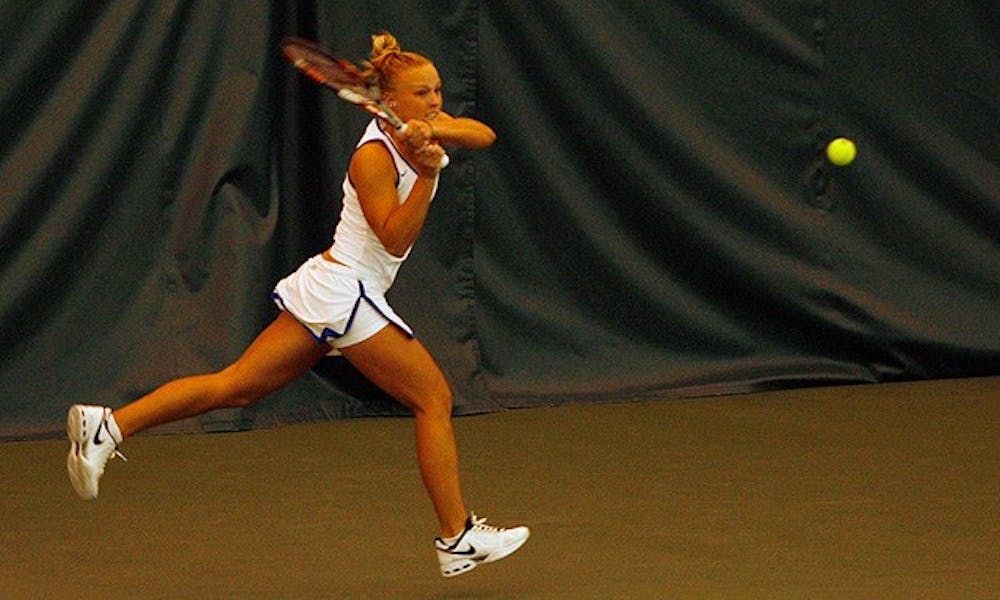The lure of professional athletics can be hard to resist. Performing at the pinnacle of your sport, taking home paychecks, sponsorships and endorsements, being surrounded by media hype and adoring fans: It can all be hard for an aspiring athlete to turn down. It was no different for Mallory Cecil.
Cecil was a member of the 2009 NCAA Tournament champion Blue Devils, and also took home the NCAA individual title. She left Duke after that season to try her hand at professional tennis, and in brief stint on the WTA Tour, she compiled a 55-46 singles record, and her ranking peaked at No. 365. But now, Cecil is back on campus. Enrolled in classes as a sophomore, she also deals with the responsibility of being a volunteer assistant coach for her former team, including some of her old teammates.
Her unique position at the University developed as a result of her passion for the game. Almost two full years ago, Cecil capped off her first, and only, season competing as a Blue Devil. Despite the life and success she had built at Duke, however, Cecil announced shortly after the NCAA Championship that she would end her collegiate career in order to pursue her dream of being a professional tennis player.
For Cecil, the decision to leave her teammates was not one she made lightly. She had discussed future plans for some time with head coach Jamie Ashworth, but when the time came to walk away from college tennis, Cecil found that it was harder than she had expected.
“It was really tough,” Cecil said. “[Telling the other girls on the team] was one of the toughest things, because I didn’t know how they would respond.”
Despite her worries, Cecil received support from her old teammates. She left to begin her career, complete with her own coach, full-time trainer and the opportunity to travel the world competing in the sport she loved. According to Cecil, the time away from the team provided her with a new viewpoint on what was important to her, and gave her an opportunity to grow as a person.
During her time as a professional athlete, however, she also began to feel the solitude that comes with a tennis career, causing her to miss the team dynamic she had become a part of at Duke.
“Winning a college match just exceeds winning a professional match, for me,” Cecil said. “Professionally, it’s a very individual sport, and collegiate you’re playing for other people... so for me it was a lot more fulfilling and gratifying than winning a professional match.”
Eventually, Cecil realized that she wanted to come back to Duke, but after accepting money as a professional she was unable to rejoin the team as a competitive player, per NCAA rules. With the help of Ashworth and the cooperation of her teammates, however, Cecil has come to fill a new role, that of volunteer assistant coach. This position still allows her to train and travel with the team, but when the matches start she is on the sidelines giving advice instead of competing on the court.
“My first reaction [to Cecil’s decision to return] was ‘How can we get her to play?’” Ashworth said. “I talked to her about helping our team and figuring out ways to get involved in the program. From the start she’s been nothing but great about everything…. I think [the other girls] still see her as a teammate.”
This time around, Cecil has decided to devote herself to getting a more well-rounded college experience. She still practices with the team, but has also joined a sorority, and is working toward graduating in three and a half years. Even though she is now unable to be a competitive part of the team, Cecil says that she does not regret the decision to compete on her own.
When she first got back to campus, however, she and Ashworth were unsure about how the new team relationship would work out.
“I was kind of nervous about coming in,” Cecil said. “Now I’m not a player, I’m more of a coaching figure, you know, these girls are my friends. How is that going to work?”
But despite their worries, the girls on the team showed excitement about having Cecil back.
“It’s really too bad that she can’t play,” Ashworth said. “She plays such a big part with our team in everything they do, whether it’s on the court or off the court…. She knows them [the girls] in a way that we don’t know them…and they’ve done a good job respecting her on the court when she’s in a coaching situation. It’s a really fine line that she has to balance.”
Cecil is managing her current situation well, and as for her plans for the future, both she and Ashworth pointed out that professional tennis is still a real consideration. According to Ashworth, both her experience as a professional athlete and as a coaching figure will prove valuable in the long run, as Cecil has had the unique opportunity not only to play against some of the best players in the world, but also to take a step back and study game patterns and strategies.
“She’s a great player who loves tennis, and loves to play,” Ashworth said. “I would love to see her give it another chance down the road.”
For now, though, Cecil is content to stay at Duke.
Get The Chronicle straight to your inbox
Signup for our weekly newsletter. Cancel at any time.

